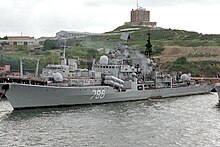43°06′43″N 131°53′16″E / 43.1118729°N 131.8878362°E
 Bystry on 15 July 2015
| |
| History | |
|---|---|
| Name |
|
| Namesake | Quick in Russian |
| Builder | Zhdanov Shipyard, Leningrad |
| Laid down | 29 October 1985 |
| Launched | 28 November 1987 |
| Commissioned | 30 September 1989 |
| Homeport | Vladivostok |
| Identification | Pennant number: 676, 715, 786 |
| Status | Decommissioned |
| General characteristics | |
| Class and type | Sovremenny-class destroyer |
| Displacement | 6,600 tons standard, 8,480 tons full load |
| Length | 156 m (511 ft 10 in) |
| Beam | 17.3 m (56 ft 9 in) |
| Draught | 6.5 m (21 ft 4 in) |
| Propulsion | 2 shaft steam turbines, 4 boilers, 75,000 kW (100,000 hp), 2 fixed propellers, 2 turbo generators, and 2 diesel generators |
| Speed | 32.7 knots (60.6 km/h; 37.6 mph) |
| Range |
|
| Complement | 350 |
| Sensors and processing systems |
|
| Electronic warfare & decoys | 2 PK-2 decoy dispensers (200 rockets) |
| Armament |
|
| Aircraft carried | 1× Ka-27 series helicopter |
| Aviation facilities | Helipad |
Bystry was a Sovremenny-class destroyer of the Soviet and later Russian navy.[1]

Development and design
editProject began in the late 1960s when it was becoming obvious in the Soviet Navy that naval guns still had an important role particularly in support of amphibious landings, but existing gun cruisers and destroyers were showing their age. A new design was started, employing a new 130 mm automatic gun turret.
The ships are 156 metres (511 ft 10 in) in length, with a beam of 17.3 metres (56 ft 9 in) and a draught of 6.5 metres (21 ft 4 in).
Construction and career
editBystry was laid down on 29 October 1985 and launched on 28 November 1987 by Zhdanov Shipyard in Leningrad.[2] She was commissioned on 30 September 1989.
On 24 September 2010, a fire broke out in the destroyer's engine room. The sailor Aldar Tsydenzhapov was able to extinguish the fire and saved the ship from a potentially disastrous explosion. Four days later, he died in hospital from his burns, and was posthumously awarded the title Hero of the Russian Federation for his actions.
From 3 to 28 June 2013, a detachment of ships – Bystry, Oslyabya and Kalar – left Vladivostok and participated in the military-historical naval Campaign of Memory dedicated to the victory in the Great Patriotic War, the 282nd anniversary of the Pacific Fleet, and the 200th anniversary of the birth of Admiral G. I. Nevelskoy. The route of the campaign was Vladivostok - Nevelsk - Yuzhno-Kurilsk - Severo-Kurilsk - Vilyuchinsk - Okhotsk - Korsakov - Yuzhno-Sakhalinsk - Vladivostok. The ships covered 4,200 miles in 25 days.[3][4]
As of the beginning of 2015, since its construction, the ship has covered 43,792 nautical miles, 13 people from the ship's crews have been awarded government awards.
On 27 January 2016, the destroyer arrived at its home port, Vladivostok. According to the results of 2016, the destroyer crew became the best among the missile and artillery ships of rank 1-2 of the Russian Navy in the competition for the prize of the Commander-in-Chief of the Russian Navy.[5]
The ship was reported to have decommissioned as of January 2022.[6]
References
edit- ^ "Destroyers - Project 956". russianships.info. Retrieved 17 December 2020.
- ^ "Sovremenny". 4 November 2005. Archived from the original on 4 November 2005. Retrieved 17 December 2020.
- ^ ""Поход памяти" кораблей Тихоокеанского флота возвращается во Владивосток". www.korabli.eu (in Russian). 27 June 2013. Retrieved 17 December 2020.
- ^ "Корабли "Похода памяти" Тихоокеанского флота покинули Камчатку". www.korabli.eu (in Russian). 17 June 2013. Retrieved 17 December 2020.
- ^ function.mil.ru https://function.mil.ru/news_page/country/more.htm?id=12104509@egNews. Retrieved 17 December 2020.
{{cite web}}: Missing or empty|title=(help) - ^ "Боевые корабли основных классов ВМФ России на 01.02.2022". February 2022.